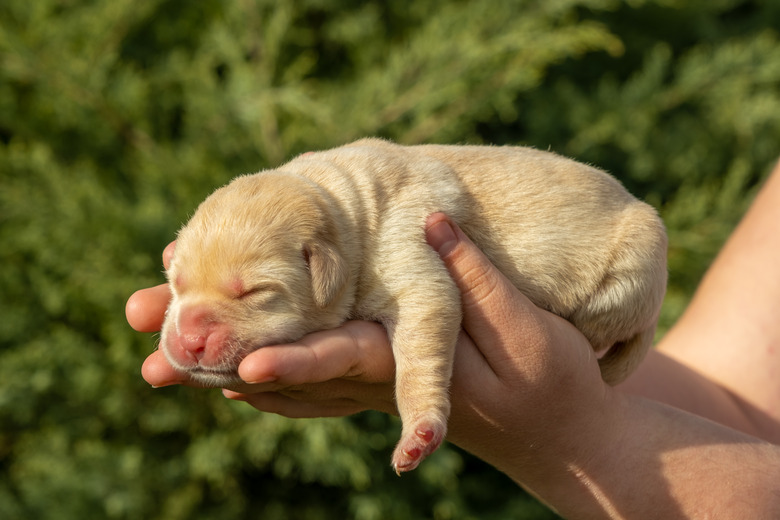What Kind Of Milk Do I Give A Newborn Puppy?
If you're caring for newborn puppies, then you've taken on a big responsibility. Sure, puppies are adorable and so much fun to watch, but a baby puppy needs frequent feedings and attentive care. Whether the newborn puppy you're caring for has been orphaned or rejected by their mother, they'll depend on you for all their needs. And one of those most important needs is regular feedings of appropriate puppy milk to give them the nutrition they require to grow and thrive.
Puppy milk to avoid
Puppy milk to avoid
Puppies need a special diet to support their growing bodies, and nutrient deficiencies can cause problems that affect them later in life. Can puppies drink milk made for humans? No. Experts agree that you should avoid feeding puppies cow's milk. Puppies need particular levels of calcium and phosphorus. The cow's milk you buy at a grocery store is diluted and doesn't contain the proper levels. Cow's milk can also cause diarrhea, which can quickly dehydrate puppies.
You should also avoid store-bought milk replacer that's intended for human use since these products can cause puppy diarrhea, which can quickly lead to dehydration. Instead, use only products specifically manufactured to serve as milk for dogs.
Store-bought puppy formula
Store-bought puppy formula
You can buy a variety of commercially available milk for a puppy to serve as milk replacer options. Some of these are available in liquid form, but more often you'll find powdered formulas that need to be reconstituted. Be sure only to purchase products made specifically for puppies, since they are formulated to provide adequate nutrition without causing digestive upset. If you're concerned about which puppy milk may be best for your puppies, their age, and their health, ask your veterinarian what they recommend.
When you prepare the milk replacer, you start by boiling water and then letting it cool. The manufacturer's instructions will most likely specific temperatures to reach. Blend the replacer into the water by creating a whirlpool by swirling the bottle, then shake the bottle up and down to finish blending. Lastly, don't forget to let the formula cool to 98 degrees before you feed it to the puppies.
Homemade puppy milk recipe
Homemade puppy milk recipe
If you live in a rural area or find that local stores are out of the formula, then you'll need a way to get by for a day or so until you can get more puppy formula. Vet Space, a website run by Dr. Ron Hines, DMV, Ph.D., recommends the following recipe for a homemade puppy formula:
- 1/2 cup evaporated whole milk
- 1/2 cup boiled water
- 1 teaspoon corn oil
- 1 drop of pediatric human vitamin, like Visorbin
- 2 raw eggs
- 1 tablespoon of plain whole yogurt
Mix the formula thoroughly and let it sit until all the air bubbles have dissipated.
This homemade formula will get you through in a pinch, but be sure to find formula made specifically for puppies as soon as you can.
Giving a newborn puppy milk
Giving a newborn puppy milk
If you have trouble finding appropriate milk for a puppy, then check in with your veterinarian's office. Some vets keep milk replacer in stock for emergencies, and your vet may be able to get you a supply until you can locate your own. Depending on the stores in your area, you may need to purchase formula online and have it shipped to you.
It's also important to realize that puppies, particularly newborn puppies, are in a very vulnerable state. Small issues, like temperature fluctuations, digestive upset, and even feedings that aren't performed frequently enough can cause serious health issues that progress quickly. If you aren't sure about how to best care for the puppies or are concerned about their health, head to your vet immediately for help. If your puppies develop diarrhea, seem lethargic, or lose their appetite, this is another reason to go to the vet promptly.


